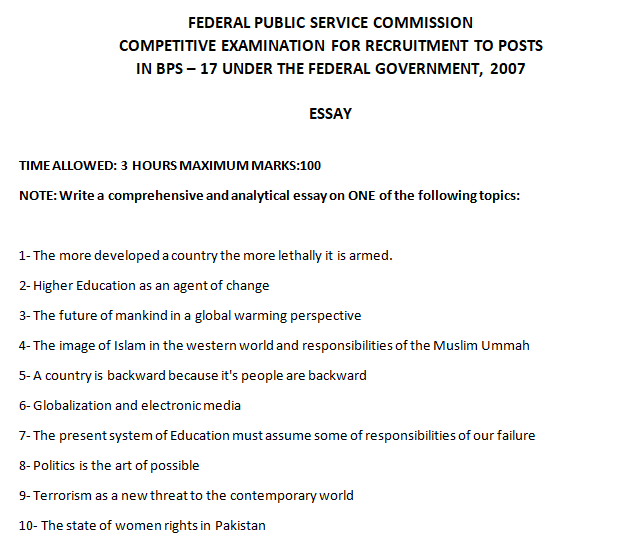css essay paper 2007
- The more developed a country the more lethally it is armed.
- Higher Education as an agent of change
- The future of mankind in a global warming perspective
- The image of Islam in the Western world and the responsibilities of the Muslim Ummah
- A country is backward because its people are backward
- Globalization and electronic media
- The present system of Education must assume some responsibility for our failure
- Politics is the art of possible
- Terrorism as a new threat to the contemporary world
- The state of women’s rights in Pakistan
Summaries of Essays:
Here are the simplified summaries for the additional essays:
1. The More Developed a Country, the More Lethally It Is Armed
This essay examines how advanced countries often develop powerful weapons for security or dominance. The writer argues that technological progress and economic strength are often diverted to arms production, increasing global insecurity. It also discusses the ethical responsibility of developed nations to promote peace instead of conflict.
2. Higher Education as an Agent of Change
This essay explores the transformative role of higher education in personal growth, societal development, and innovation. It argues that universities produce leaders, thinkers, and skilled workers who drive progress. The writer emphasizes the need for accessible, quality education to address challenges like poverty and inequality.
3. The Future of Mankind in a Global Warming Perspective
This essay highlights the severe consequences of global warming on human survival, including rising sea levels, extreme weather, and resource shortages. It emphasizes urgent action to reduce emissions, adopt renewable energy, and promote sustainability to secure a better future for mankind.
4. The Image of Islam in the Western World and the Responsibilities of the Muslim Ummah
This essay discusses the misconceptions about Islam in the West due to media portrayal and global politics. The writer urges the Muslim community to counter stereotypes through education, unity, and positive contributions to society. It also stresses interfaith dialogue to promote understanding.
5. A Country is Backward Because Its People Are Backward
This essay argues that a nation’s progress depends on the mindset, education, and work ethic of its citizens. It highlights how ignorance, corruption, and lack of initiative contribute to underdevelopment. The writer calls for personal and collective efforts to change attitudes and uplift the nation.
6. Globalization and Electronic Media
This essay explores how globalization, fueled by electronic media, has connected the world. While it promotes cultural exchange and economic growth, it also spreads consumerism and challenges local traditions. The writer stresses balancing global influences with preserving cultural identity.
7. The Present System of Education Must Assume Some Responsibility for Our Failure
This essay critiques the education system for not preparing students to face real-world challenges. It highlights issues like rote learning, outdated curricula, and lack of critical thinking. The writer calls for reforms to make education more practical, inclusive, and innovative.
8. Politics is the Art of the Possible
This essay explores the nature of politics as a practical and flexible field focused on achieving goals within constraints. The writer highlights how compromise and adaptability are necessary for progress. It also addresses the ethical dilemmas politicians face while pursuing realistic solutions.
9. Terrorism as a New Threat to the Contemporary World
This essay discusses terrorism as a major global challenge, affecting security, economies, and peace. It examines the causes, such as extremism and inequality, and the devastating consequences. The writer calls for global cooperation, education, and fair policies to combat terrorism effectively.
10. The State of Women’s Rights in Pakistan
This essay highlights the struggles women face in Pakistan, such as inequality, domestic violence, and lack of education. It discusses progress made through laws and awareness but stresses that much work remains. The writer advocates empowering women through education, economic opportunities, and social reforms.
